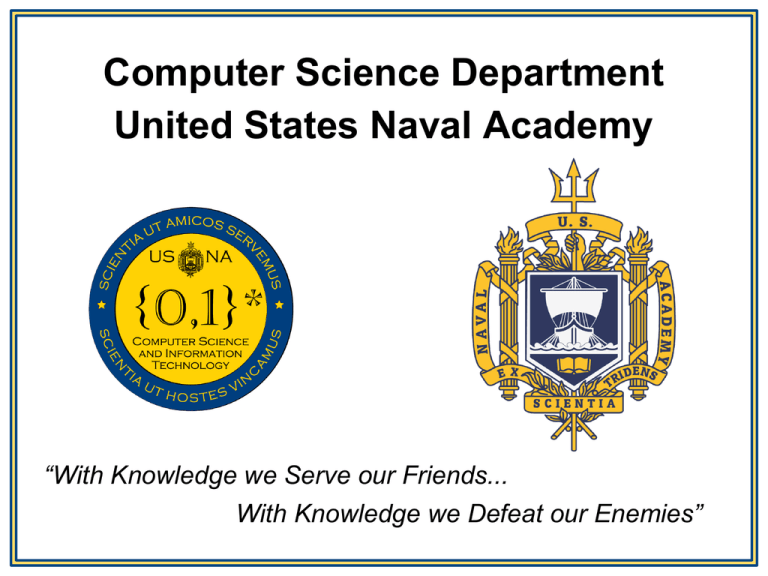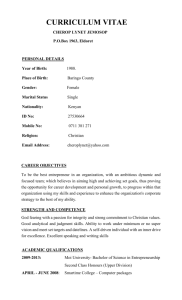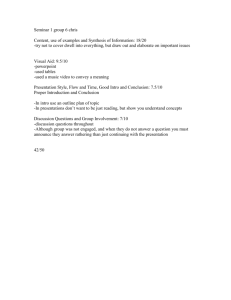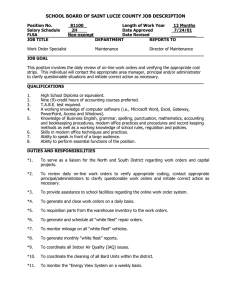Computer Science Department United States Naval Academy
advertisement

Computer Science Department United States Naval Academy “With Knowledge we Serve our Friends... With Knowledge we Defeat our Enemies” Overview >Why CS/IT? -Resources -Curriculum Compare -Matrices -Options -CS/IT/CY Future -Training -Capstone -In The Fleet Two ABET Accredited Majors Computer Science is the traditional computing degree and encompasses algorithms, artificial intelligence, robotics, and graphics. Computer Science (CS) Computer Science Department Information Technology (IT) Information Technology is a more applied computing degree and encompasses web technology, databases, and computer security. See http://www.abet.org/why-accreditation-matters/ to learn more about the importance of accreditation! Overview >Why CS/IT? -Resources -Curriculum Compare -Matrices -Options -CS/IT/CY Future -Training -Capstone -In The Fleet NACE Salary Survey The following represents the average starting salary & salary ranges for Class of 2013 graduates, ordered by CS & IT graduates are in demand! discipline: Source: NACE, Salary Survey - September 2013 Executive Summary, http://www.naceweb.org/salary-survey-data/ Overview >Why CS/IT? -Resources -Curriculum Compare -Matrices -Options -CS/IT/CY Future -Training -Capstone -In The Fleet U.S. News 100 Best Jobs The top-10 rankings below take into account employment opportunity, salary, work-life balance, and job security: 1. 2. 3. 4. 5. 6. 7. 8. 9. 10. } Dentist Registered Nurse Pharmacist Computer Systems Analyst Physician Database Administrator Software Developer Physical Therapist Web Developer Dental Hygienist In other words… if you’re not in the medical or dental professions, you belong in Computer Science & Information Technology! Source: US News Careers, The 100 Best Jobs, http://money.usnews.com/careers/best-jobs/rankings/the-100-best-jobs Overview >Why CS/IT? -Resources -Curriculum Compare -Matrices -Options -CS/IT/CY Future -Training -Capstone -In The Fleet Growth, Pay, Relevance ● Fastest growing segment of our economy: CS & IT consistently dominate lists of highest paying, fastest growing and most rewarding jobs. ● Skills learned are essential both in the fleet and on the joint cyber battlefield. ● Computing is everywhere – in phones, cars, ships, aircraft, etc. Understand and harness this power in a technical setting while at USNA. CS & IT See http://www.usna.edu/CS/academics/why.htm for more details on why CS and IT are so important! Overview -Why CS/IT? >Resources -Curriculum Compare -Matrices -Options -CS/IT/CY Future -Training -Capstone -In The Fleet Military And Civilian Faculty An accomplished and highly motivated group of educators draw on unique experiences both from the Fleet and from traditional academic pursuits: ● Military ○ ○ Hold Masters degrees or better and have completed one or more operational tours, bringing real Fleet experience to the classroom Come from many communities across multiple services including the Navy, the Marine Corps, and the Air Force ● Civilian ○ ○ Hold Doctoral degrees and contribute professional knowledge in the classroom and through exciting research Include Distinguished Visiting Professors, Professor Emeriti, and a Visiting Professor from the National Security Agency (NSA) Overview -Why CS/IT? >Resources -Curriculum Compare -Matrices -Options -CS/IT/CY Future -Training -Capstone -In The Fleet Michelson Hall After completing a drastic renovation in December 2004, Michelson Hall stands as the high-tech home of the Computer Science Department, providing: ● Eight reconfigurable computer labs running Windowsand/or Linux-based operating systems ○ ○ Each state-of-the-art lab is capable of providing an internet-enhanced learning experience to more than twenty students per section A dedicated and professional team of support staff enable a highly adaptive environment for both students and faculty ● Lounge and research spaces for use by midshipmen ○ ○ ○ A student lounge on third deck provides a comfortable and engaging environment for both group and individual study Wireless internet access is available in all classrooms and lounges Designated research space for Bowman and Trident Scholars Overview -Why CS/IT? -Resources >Curriculum Compare -Matrices -Options -CS/IT/CY Future -Training -Capstone -In The Fleet CS & IT Required Courses ● IC210 - Intro to Computer Science How do you tell a computer what to do? This course serves as an introduction to algorithmic development, problem solving and software design. Key principles and concepts are covered to provide foundational knowledge and experience upon which later computing courses will build. ● IC211 - Object-Oriented Programming How can I build and utilize collections of "objects" to solve a problem? This course builds on the procedural programming skills developed in the prerequisite course and introduces the student to object oriented programming and design principles using Java. ● IC220 - Computer Architecture and Organization How does my computer really work and why does it matter? This course introduces students to performance metrics, instruction set architectures, assembly language, logic design, memory hierarchies, and pipelining. Overview -Why CS/IT? -Resources >Curriculum Compare -Matrices -Options -CS/IT/CY Future -Training -Capstone -In The Fleet CS & IT Required Courses ● IC221 - Systems Programming I’ve got a program, but how does it actually do work? This is the study of an application's interface with the operating system. The operating system is treated as an information resource, and as a facilitator for information flow between processes, including those executing on separate machines. ● IC312 - Data Structures What is the best way to organize and access my information? This course examines abstract data types (ADT), data structures, data representation and information management including storage structures, allocation and collection. ● IC322 - Computer Networks How does the internet transmit data? This course presents the fundamental theoretical concepts, characteristics and principles of computer communications and computer networks, and analyzes and assesses these foundational concepts with respect to network performance and design. Overview -Why CS/IT? -Resources >Curriculum Compare -Matrices -Options -CS/IT/CY Future -Training -Capstone -In The Fleet CS & IT Required Courses ● IC411 - Operating Systems Who controls the computer’s memory and files? Learn about the operating system as a resource manager. Topics include process management, interrupt processing, memory management, deadlock handling, file systems, multiprogramming, multiprocessing, data security and protection. ● IC470 - Software Engineering How do teams build large, complex, and reliable software? Discover the basic principles of software engineering. Structured, object-oriented, and formal approaches are studied, with emphasis on life cycles, object-oriented techniques and team-oriented software development. ● IC480 - Research Seminar / Capstone How can my team and I apply technical knowledge to make something exciting? This is a capstone course that ties together concepts from the information technology and computer science curricula to solve a practical problem. Overview -Why CS/IT? -Resources >Curriculum Compare -Matrices -Options -CS/IT/CY Future -Training -Capstone -In The Fleet CS Required Courses ● SI340 - Theory of Computing Are there any problems that can’t be solved efficiently or at all? This course presents the theoretical foundations for computing, including the study of formal languages, finite state machines, pushdown automata, Turing machines and computability. ● SI335 - Computer Algorithms How can my program solve a problem in the quickest manner? This course presents techniques for designing and analyzing computer algorithms including divide and conquer, dynamic programming and greedy methods. ● SI413 - Programming Languages and Implementation What makes a particular programming language useful, and how does it really work? This course examines basic concepts underlying the design of modern programming languages: types, control structures, abstraction mechanisms, inheritance, concurrency and constructs for programming. Overview -Why CS/IT? -Resources >Curriculum Compare -Matrices -Options -CS/IT/CY Future -Training -Capstone -In The Fleet IT Required Courses ● IT350 - Web and Internet Programming What are some tools and techniques for designing the next killer web site? This course covers web site design and management, clients and servers, client and server side scripting languages, web transmission protocols. ● IT360 - Applied Database Systems How can I make data universally accessible? This course introduces the principles underlying Database Management Systems (DBMS) with a special emphasis on database management system structure and function when integrated with web-based database applications. ● IT430 - Information Assurance and Network Security How can I rest at night knowing my information is protected? This course is an introduction to the theoretical and practical facets of Information Assurance (IA) to include: governmental policies and directives, Cryptography, Information Warfare, and Network Security, among others. Overview -Why CS/IT? -Resources >Curriculum Compare -Matrices -Options -CS/IT/CY Future -Training -Capstone -In The Fleet Sample Elective Offerings ● ● ● ● ● SI420 - Artificial Intelligence SI455 - Advanced Computer Networks SI460 - Computer Graphics SI475 - Intelligent Robotics SI485I - Natural Language Processing Many of these courses may be taken by either CS or IT majors, depending on prerequisites. ● ● ● ● ● CS Electives Follow these links for more details! IT432 - Advanced Information Assurance and Network Security IT452 - Advanced Web and Internet Systems IT462 - Advanced Database Systems IT486C - Malware Analysis Electives IT486D - Mobile OS Development IT Overview -Why CS/IT? -Resources -Curriculum Compare >Matrices -Options -CS/IT/CY Academic Matrices Future -Training -Capstone -In The Fleet Overview -Why CS/IT? -Resources -Curriculum Compare -Matrices >Options -CS/IT/CY Future -Training -Capstone -In The Fleet Dual Major Get more from your education with a dual major in CS & IT; only 5 additional courses required! Delve into both foundational... ...and practical computing topics! Computer Science Information Technology Overview -Why CS/IT? -Resources -Curriculum Compare -Matrices >Options -CS/IT/CY Future -Training -Capstone -In The Fleet Graduate Education ● VGEP at Johns Hopkins University ○ Attend graduate school locally during Spring 1/C year at JHU Applied Physics Laboratory ● IGEP at Naval Postgraduate School ○ Secure admission to NPS for follow-on graduate education in Monterey, CA ● Navy or Marine Corps Burke Program ○ ○ Earn a Masters degree after completing your first Navy operational or Marine FMF tour Typically completed at NPS or Air Force Institute of Technology in 1 to 2 years ● Find your own program! ○ Midshipmen have studied at MIT, Penn, and numerous other schools following graduation Overview -Why CS/IT? -Resources -Curriculum Compare -Matrices -Options >CS/IT/CY Future -Training -Capstone -In The Fleet CS, IT & CY Comparison Computer Science (CS) Information Technology (IT) Cyber Operations (CY) Focus on scientific foundations of computing, including design Summary & implementation of programming languages, program efficiency, and limits of computation. Focus on applications of computing including web & internet programming, databases, and computer & network security. Provides a foundation of computers, programming, and networks, and then broadens out to a view of cyber which includes legal issues, policy, hacktivism, social factors. Deeper foundational material on Tradeoffs computing (in exchange for less coverage of applications) More depth on applications (in exchange for less foundational material on computing) Favor breadth of topics over depth (e.g., control systems, EM spectrum, ethics, policy, law, and human factors) In-major Courses Technical: 15 to 16 courses Non-technical: 0 to 1 courses Technical: 15 to 16 courses Non-technical: 0 to 1 courses Technical: 10 to 12 courses Non-technical: 3 to 5 courses Electives Artificial Intelligence, Robotics, Natural Language Processing, Graphics, Cryptography, Network Attack & Defense Mobile computing, Forensics, Advanced Web, Advanced Information Assurance, Network Attack & Defense Cyber-Physical Systems, History of Cyber-warfare, Cyber Defense Strategies, Applied Cryptography, Applied Forensics Internship Options NSA, DISA, NRO, Draper Labs, NPS, NRL, Cyber Warfare Dev. Group, CYBERCOM, CACI Overview -Why CS/IT? -Resources -Curriculum Compare -Matrices -Options -CS/IT/CY Future >Training -Capstone -In The Fleet Cyber Defense Exercise (CDX) ● Intense 96-hour event ○ Live attack/defense between NSA and cadets/mids from all services. ● Fierce inter-academy rivalry ○ Help us win the next competition! Overview -Why CS/IT? -Resources -Curriculum Compare -Matrices -Options -CS/IT/CY Future >Training -Capstone -In The Fleet Training, Internships Students can receive professional level training at exciting venues that costs thousands of dollars, all at no cost to midshipmen! Want to work at the NSA with a Top Secret clearance before you graduate? Many CS/IT midshipmen do just that every summer! Overview -Why CS/IT? -Resources -Curriculum Compare -Matrices -Options -CS/IT/CY Future -Training >Capstone -In The Fleet Capstone Projects The current CS/IT Capstone list is not an accurate representation of your future project choices. Why? Because yours will be new and exciting! ● Work with a team of your peers from CS and IT to research and solve a real-world problem ● Complete all phases of software development from analysis and planning to testing and deployment ● Apply knowledge learned from both disciplines while sharpening communication and decision-making skills See http://www.capstone-proposals.cs.usna.edu/index.php?title=Main_Page for the most current listing! Overview -Why CS/IT? -Resources -Curriculum Compare -Matrices -Options -CS/IT/CY Future -Training -Capstone >In The Fleet Information Dominance Corps Information Warfare (IW) Information Warfare officers execute the full spectrum of cyberspace operations to include cryptology, information operations and electronic warfare in the electromagnetic and space domains. Information Professional (IP) Information Professional officers use expertise in information, C2 and space systems to operate, maintain, secure, plan and acquire the Naval network and the systems that support Naval operations. Overview -Why CS/IT? -Resources -Curriculum Compare -Matrices -Options -CS/IT/CY Future -Training -Capstone >In The Fleet Every Community Needs CS/IT Whether it’s controlling today’s complex military hardware… ...or designing the next generation of unmanned vehicles… ...the Navy needs technology-minded officers! Overview -Why CS/IT? -Resources -Curriculum Compare -Matrices -Options -CS/IT/CY Future -Training -Capstone -In The Fleet Still Unsure About CS & IT? Come visit us on the third deck in Michelson Hall -orcontact any of the helpful faculty and staff found here. “We can only see a short distance ahead, but we can see plenty there that needs to be done.” -Alan Turing “Computer science is no more about computers than astronomy is about telescopes.” -Edsger Dijkstra

![[STORY ARCHIVES IMAGE]](http://s3.studylib.net/store/data/007416224_1-64c2a7011f134ef436c8487d1d0c1ae2-300x300.png)



